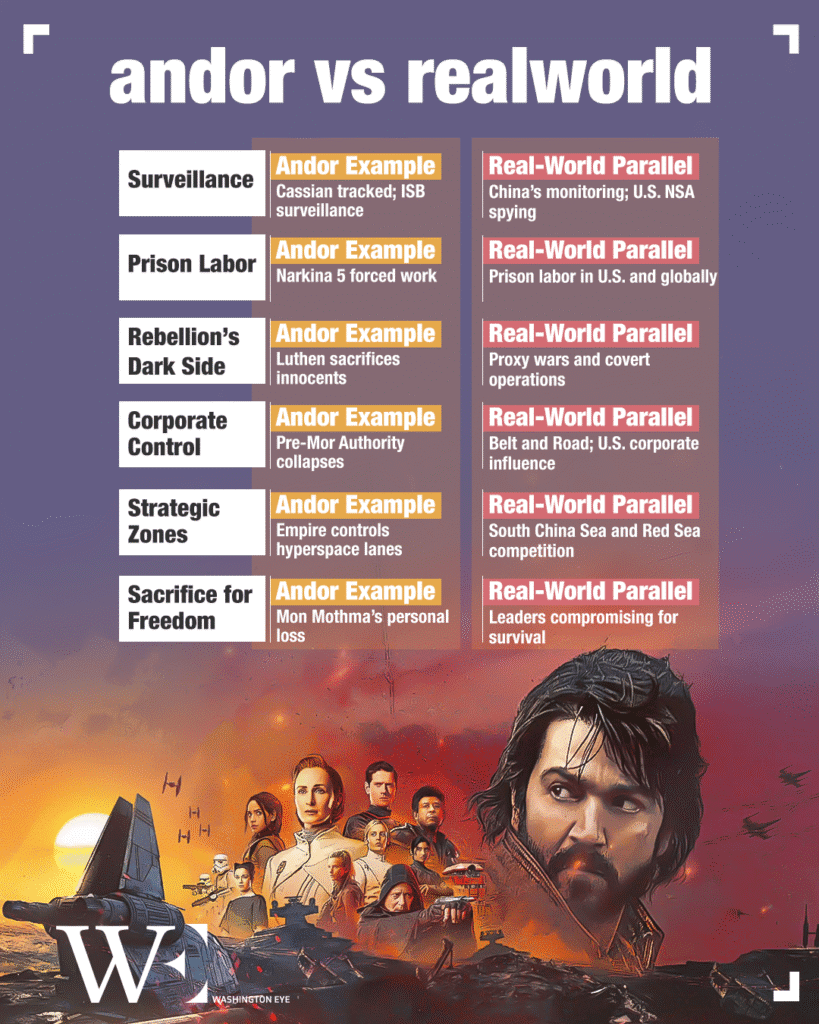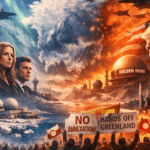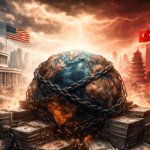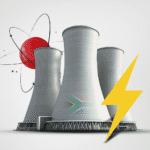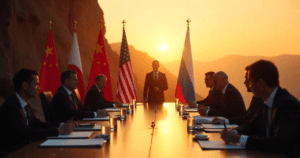When Andor first arrived on screens, it immediately stood apart from the sprawling saga of Star Wars. Gone were the sweeping lightsaber duels and mystic prophecies. Instead, Andor delivered a cold, slow-burning story about how people learn to resist an empire — not in a blaze of glory, but in the quiet despair of prison cells, brutal markets, and bureaucratic offices.
As season two of Andor prepares to tie Cassian Andor’s journey closer to the events of Rogue One, the series feels less like science fiction and more like a warning. It is impossible not to look around today — at the South China Sea, the Red Sea, and the growing rivalry between the United States and China — and recognize uncomfortable parallels. Andor reminds us that empires are not born from evil alone. They rise through fear, surveillance, ambition, and the silent complicity of those who look the other way.
From the first scenes in season one, it is clear how the Empire controls not just with brute force, but with paperwork, cameras, and whispered threats. On Ferrix, Cassian is watched long before a single shot is fired. His debts, his family ties, and even casual conversations are combed over by corporate security. In today’s world, the reach of surveillance mirrors this eerily well. In China, mass monitoring systems track citizens’ movements, purchases, and communications. In the United States, exposed intelligence programs remind us that no democratic nation is immune from the temptation to watch its own citizens under the pretext of safety.
Yet Andor resists simple villainy. Figures like ISB officer Dedra Meero believe they are heroes, working tirelessly to maintain order against dangerous forces. This reflects the real-world mindset of superpowers that see their interventions, military bases, or surveillance programs as necessary defenses against chaos. In truth, empire often wears the face of sincerity.
When Cassian is imprisoned at Narkina 5, Andor reveals the soul of authoritarian control. Inmates build unknown machine parts under perfect psychological captivity, with no bars on their cells. They are fed, ranked, and punished through electrified floors. Their compliance is extracted quietly, efficiently, and endlessly. Watching these scenes, it is impossible not to think about prison labor systems today, where people are turned into cogs for economic machinery under the guise of justice.
Kino Loy’s transformation from obedient supervisor to revolutionary leader is one of the series’ emotional peaks. His reluctant leadership reminds us that even those who believe in the system can eventually awaken to its lies. His words echo long after the breakout: “We are cheaper than droids, and easier to replace.” Around the world, too many workers, from factory floors to prison yards, live this same expendability.
Luthen Rael, the shadowy architect of rebellion, offers Andor’s most brutal moral truth. His haunting speech — “I burn my life to make a sunrise I know I’ll never see” — captures the darkness that often lies beneath noble causes. Luthen manipulates, sacrifices innocents, and crosses every line because he believes the Rebellion needs it. In today’s geopolitical arena, superpowers justify covert operations, proxy wars, and brutal alliances in the name of a future peace. The line between hero and villain blurs fast when the stakes are survival.
The economic backdrop of Andor is equally important. The Pre-Mor Authority, a private security company acting like colonial enforcers, evokes the real-world blend of corporate and governmental power. In Star Wars lore, the Corporate Sector Authority ran vast swaths of space for profit. Today, China’s Belt and Road Initiative spans continents, tying nations into debt and influence. American tech giants and defense contractors, too, wield enormous sway over global markets and policies. Modern empire is often built not by armies, but by contracts and supply chains.
When the Pre-Mor authorities fail on Ferrix, the Empire quickly nationalizes the sector. In the end, the corporate experiment was only tolerated until it failed to serve imperial needs. In today’s world, as economic competition between China and the United States intensifies, corporations often act as tools of national strategy, merging economic dominance with political control.
The stakes become clearest when we look at the great strategic arenas of our time. In the Red Sea, attacks on shipping and rising military activity have drawn in both American and Chinese naval power. In the South China Sea, China’s artificial islands — fortified with airstrips and missile systems — transform open water into contested territory. The United States challenges these claims with freedom of navigation patrols, but every movement risks triggering a broader conflict. In Andor, hyperlanes and resource worlds are fought over ruthlessly. In our world, shipping lanes and maritime chokepoints have become the silent battlegrounds of a new cold war.
Even within resistance movements, moral compromise is inescapable. Mon Mothma’s journey from respected senator to secret rebel funder is filled with personal agony. She risks her family’s safety, her social standing, and eventually her daughter’s future to quietly finance rebellion. Her dilemma echoes the choices faced by real-world leaders and activists: balancing ideals with survival, struggling against larger forces with imperfect means.
The genius of Andor is that it does not offer comforting fantasies of good and evil. It shows empire for what it truly is — mundane, bureaucratic, omnipresent. It shows rebellion not as a grand, clean triumph, but as a painful, costly, deeply human struggle.
Today, as America and China engage in an uneasy dance of competition, as warships patrol ancient seas, and as alliances shift and crumble, Andor reminds us that history is always closer than we think. Empires don’t simply announce themselves. They are built silently — with surveillance cameras, with trade routes, with data centers, with fear dressed up as order.
And in the end, rebellion does not come from heroes alone. It comes from people like Cassian Andor — reluctant, scared, compromised — who simply refuse to accept life on someone else’s terms anymore.
We like to think we would recognize empire when it arrives. Andor whispers that perhaps we already live inside it.
